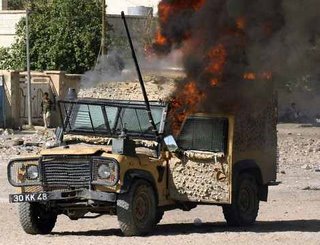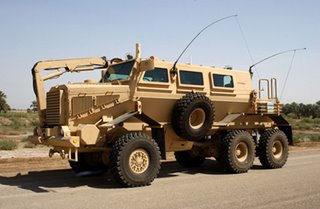 "While the world remains understandably transfixed on Lebanon and Israel, one fact bears keeping in mind: more people were killed in Iraq in the past two weeks than in Israel and Lebanon combined," writes Andrew Sullivan in The Sunday Times.
"While the world remains understandably transfixed on Lebanon and Israel, one fact bears keeping in mind: more people were killed in Iraq in the past two weeks than in Israel and Lebanon combined," writes Andrew Sullivan in The Sunday Times.The numbers tell the story: 2,669 Iraqis lost their lives to violence in May. In June the number jumped to 3,149. Almost all the deaths were deliberate targeting of civilians. The attempt after the death of insurgent Abu Musab al-Zarqawi to assert the Maliki government's control of Baghdad — a police and military offensive in the capital — has been revealed as a failure within a few weeks.
In many ways, says Sulivan, the biggest story of the past fortnight may, in other words, have been missed. It was not the moment that Israel used "disproportionate” force; it was the moment when the West's inadequate force in Iraq was revealed as finally, irredeemably, insufficient to the task."
It is rather apposite, therefore, that in the Booker column today is a picture (above) which illustrates precisely one aspect of that "inadequate force… insufficient to the task". This is a burning Snatch Land Rover, which has been hit by a roadside bomb.
Booker recalls that I have been pointing out on this blog why these hopelessly inadequate patrol vehicles, which provide no protection against mines or roadside bombs, have been responsible for the deaths of more than a quarter of the 84 British soldiers who have been killed in action in Iraq. He also reminds us that in June, when this was first raised in the Lords, the defence procurement minister, Lord Drayson, insisted that these unarmoured Land Rovers provided "the level of protection we need".
Now that the MoD is to buy 100 Cougars (rather longer and wider than the RG 31s which it had earlier claimed were too large), Fraser Nelson, in his column in The Business tells us that "it quickly became apparent that the Snatch Land Rover was easily torn apart by roadside bombs." So, he writes:
Mr Browne negotiated an extra £40m from the Treasury for 100 US-made Cougar vehicles, which can survive such attacks, for delivery in November. As defence procurement goes, it represents lightening speed and an encouraging ability to change the mission depending on what is learned.This, however, is not exactly how it looks to us. Although the vulnerability of the Snatch Land Rover indeed did quickly become apparent, it became so as early as 2004 and it has taken the MoD over two years to respond – in the face of counting evidence and unnecessary casualties. This hardly represents an "encouraging ability" to change the mission.
Apart from this, as Booker points out, welcome though this news is, even here the tale has a nasty twist. To meet the MoD's needs, it seems, the small US firm making the Cougars must delay meeting an order for similar vehicles for the Iraqi army. So the safety of British troops is to be bought at the expense of their Iraqi comrades.
This assertion is largely speculative for MPs are now on holiday for 76 days, and the MoD – which made the announcement the day before parliament broke-up for the holidays – cannot be grilled on this. But, while Defense Industry Daily points out that BAE Systems is using its United Defense plant for some of the production, we have no doubt that there must be some delay in producing the vehicles ordered for the Iraqi Army. If we are wrong, no doubt the MoD will now be quick to tell us.
 More to the point, the purchase of what amounts to an improvement in passive protection does not indicate any change in tactics or strategic direction in southern Iraq. That would require equipment such as the Buffalo (pictured right) and a re-structuring of the Army, enabling it actively to hunt for IEDs, an increase of which would surely be the result of any attempt by the British to wrest control of Basra from the militias and bring the city under the control of Nouri al-Maliki's government.
More to the point, the purchase of what amounts to an improvement in passive protection does not indicate any change in tactics or strategic direction in southern Iraq. That would require equipment such as the Buffalo (pictured right) and a re-structuring of the Army, enabling it actively to hunt for IEDs, an increase of which would surely be the result of any attempt by the British to wrest control of Basra from the militias and bring the city under the control of Nouri al-Maliki's government.While Andrew Sullivan does not deal with this situation, his piece does paint the bigger picture. He argues that the war in Iraq is being waged by Islamist Shi'ite militia and is, in some ways, the same war that is being fought out in Lebanon
The trouble is that, with British forces tied up in not fighting the war in Iraq, none are available for the projected "stabilisation force" on the borders of Israel, making Blair an impotent observer when it comes to really influencing events.
But, in many ways, although Lebanon is currently capturing the headlines, Sullivan argues that Iraq is much more important. The Hezbollah provocation, sponsored and armed by Iran, is dangerous in itself, he writes:
Combined with the developments in Iraq, it presages a real and new shift in power. If Tehran gains a Shi'ite mini-state with vast oil reserves in Iraq, if its nuclear programme continues unchecked, if its proxy fighters in Lebanon continue to show the tenacity and barbaric targeting of civilians that they have demonstrated so far, we have the makings of a war in the Middle East with Iran as the central player, vowing to rival Al-Qaeda as the spearhead of the new caliphate.Sullivan adds:
The Israelis are aware of this because their survival depends on it. Their elimination as a people and a nation is a central tenet of Hezbollah’s and Tehran’s ideology. That is why their response in Lebanon, however awful the collateral civilian deaths and injuries, and however unsettling to the region, is rational from their point of view. It is disproportionate only if you ignore the existential threat that they increasingly face.But it is to Bush that Sullivan directs his ire:
Bush's bungled, unserious Iraq occupation has given the Shi'ite Islamists an opportunity. In southern Lebanon they have opened a polarising second front. In southern Iraq they are gaining a new and potentially deadly base of operations. From that base, their true intentions will shortly become clearer. And the future darker.However, southern Iraq is occupied and administered by the British. It is as much Blair's "unserious Iraq occupation" that is giving the Shi'ite Islamists an opportunity. And buying a 100 Cougars will not make any difference. Thus, while, rightly, we are all focused on Lebanon, it is still important that we should be looking the other way.
COMMENT THREAD
No comments:
Post a Comment
Note: only a member of this blog may post a comment.